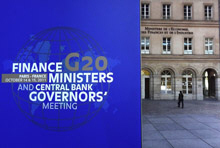
Typical street scene in Santa Ana, El Salvador. (Photo: iStock)
IMF Survey: G-20 Reaffirms Commitment to Resolve Crisis
October 15, 2011
- Lagarde warns of further risks to the global economy
- Progress in discussions on how to strengthen the international monetary system
- G-20 commits to ensuring that IMF has adequate resources to fulfill its systemic responsibilities
Finance ministers and central bank governors of the Group of Twenty (G-20) industrialized and emerging market economies said they remained committed to take all necessary actions to preserve the stability of banking systems and financial markets, as they wrapped up their final meeting before the G-20 Leaders’ Summit in Cannes in early November.

People walk near the French Ministry of Economy, Finance, and Industry in Bercy, France. G-20 ministers have called on the IMF to further consider new ways of providing short-term liquidity (photo: Charles Platiau/Newscom)
G-20 FINANCE MINISTERS MEETING
Emphasizing the urgency of the situation, IMF Managing Director Christine Lagarde said risk perspectives have become more somber and the weak economic situation of advanced economies is now affecting emerging countries.
The G-20 nations, which represent more than 80 percent of the global economy, met in Paris October 14-15 under the auspices of the French G-20 presidency amid further turmoil in world financial markets, as euro area leaders continue discussions on how to decisively address the sovereign debt problems that have made Europe the epicenter of the current crisis of confidence.
Stopping contagion in Europe
G-20 Ministers called on the euro area to decisively address the current challenges through a comprehensive plan that involves further work to maximize the impact of the European Financial Stability Facility (EFSF). Euro area leaders have pledged to deal effectively with the crisis at the next meeting of the European Council on October 23.
Strong and credible medium-term consolidation can restore confidence and create space to accommodate growth in the short run, depending on country circumstances, Lagarde said. If countries implement adjustment programs, partners must support them.
She also emphasized the importance of boosting bank liquidity to avoid a deeper economic dislocation and ease bank funding strains. Capital buffers are needed to withstand further turmoil, boost confidence, and get credit flowing again—which in turn will boost growth and employment, she said.
Strengthening the international monetary system
As part of its work program, and working closely with the G-20, the IMF has been studying ways to strengthen the international monetary system. In their communiqué, the G-20 Ministers said they are taking concrete steps to build a more stable and resilient international monetary system both to help deal with the current stress and help promote longer-term stability.
On the issue of capital flows, the G-20 has now agreed on a set of “coherent conclusions” to guide countries on how to manage such flows. In emerging markets in particular, large and volatile flows have tended to exacerbate domestic booms and busts. The IMF started reexamining these issues soon after flows to emerging market economies began to rebound from the global crisis, preparing research and analysis that looked in detail at how to use the policy toolkit available to countries, including capital controls.
G-20 Ministers also welcomed recent improvements in the quality and effectiveness of the IMF’s surveillance. The Fund is wrapping up an in-depth study of its surveillance and will shortly be making recommendations in a number of areas, including how to improve its ability to detect and warn about risks, and ensure the candor and evenhandedness of surveillance.
G-20 Ministers reached agreement on a set of common principles for cooperation between the IMF and regional financial arrangements. This work is part of the Fund’s wider work to strengthen the global financial safety net to address crisis risks from the increasingly complex financial and economic links between countries and markets.
As a contribution to a more structured approach, the G-20 Ministers asked the IMF to further consider new ways to provide on a case-by-case basis short-term liquidity to countries facing exogenous, including systemic, shocks, building on existing instruments and facilities. They called on the Fund to develop concrete proposals by the Cannes Summit.
A number of precautionary measures were set up in the crisis triggered by Lehman Brothers, in particular, flexible credit lines. That’s the direction we need to go in, in particular by focusing on short-term liquidity and precautionary resources for innocent bystanders of the economic crisis, Lagarde said.
G-20 ministers said they were committed to ensuring that the IMF has adequate resources to fulfill its systemic responsibilities and looked forward to a discussion of this in Cannes. They also called for the full implementation of the 2010 quota and governance reform of the IMF.
The IMF has programs with more than 50 countries around the world and has committed more than $325 billion in resources to its member countries since the start of the global financial crisis. The Fund’s new lending capacity currently stands at about $385 billion.
Work is also underway to develop a criteria-based path to broaden the basket of the SDR, the IMF’s international reserve asset, based on the existing criteria. In particular, there is interest in broadening the basket to make it more representative of the global economy.


